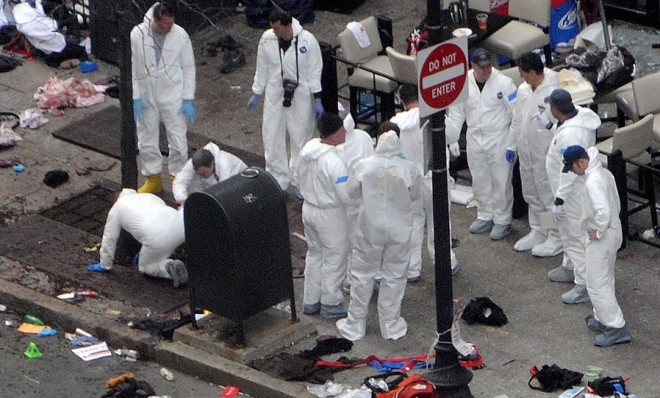Why do we know so little about what happened in Boston?
The FBI says "the range of suspects and motives remains wide open"

A free daily email with the biggest news stories of the day – and the best features from TheWeek.com
You are now subscribed
Your newsletter sign-up was successful
For a crime that was so well-documented, we know very little about what actually happened at the finish line of the Boston Marathon. "At this time there are no claims of responsibility," FBI officials told a press conference on Tuesday, according to Fox News. "The range of suspects and motives remains wide open."
In his Monday address to the nation, President Obama listed everything we don't know about the attacks:
What we don't yet know, however, is who carried out this attack, or why; whether it was planned and executed by a terrorist organization, foreign or domestic, or was the act of a malevolent individual... We do not know who did them. We do not know whether this was an act of an organization or an individual or individuals. We don't have a sense of motive yet. So everything else at this point is speculation. [White House]
In other words, we know absolutely nothing, despite the fact that the attack happened in "probably one of the most well photographed areas in the country," according to Boston police commissioner Ed Davis.
The Week
Escape your echo chamber. Get the facts behind the news, plus analysis from multiple perspectives.

Sign up for The Week's Free Newsletters
From our morning news briefing to a weekly Good News Newsletter, get the best of The Week delivered directly to your inbox.
From our morning news briefing to a weekly Good News Newsletter, get the best of The Week delivered directly to your inbox.
Such a wealth of digital information, provided by smartphone-wielding citizens, didn't exist a decade ago. Yet, as CNN's Holly Yan and Matt Smith point out, we had a much better grasp of things in the aftermath of tragic events that happened in the pre-iPhone age: "Within a day of the Oklahoma City bombing, officials had named their suspect: Timothy McVeigh. Within two days of the 9/11 attacks, investigators had zeroed in on al Qaeda as the perpetrator."
What is the holdup?
One problem is that the bombs used were so simple, made with pressure cookers filled with metal shards, ball bearings, and nails. These kinds of bombs have been used all over the world, from the 2006 Mumbai train attacks to the foiled bomb attack in Times Square in 2010. Instructions for how to build them can be found easily online.
The ease of making a pressure-cooker bomb makes the job of forensics teams that much more difficult. The fact that almost all of the ingredients used to make the explosives are, on their own, hardly worth remembering, make it less likely that they can be traced back to a seller.
A free daily email with the biggest news stories of the day – and the best features from TheWeek.com
Combing through the debris from the explosions will also be difficult. According to Boston police commissioner Edward F. Davis, investigators are dealing with "the most complex crime scene we've dealt with in the history of our department." As Maria Sacchetti notes in The Boston Globe, thousands of people were streaming through that stretch of Boylston Street — one of the city's busiest thoroughfares even when it isn't doubling as the finish line of the Boston Marathon — before the explosions took place.
Right now, the FBI is asking people to email them any potentially helpful photos or video. Obtaining footage will be easy. Sorting through it will be the hard part.
A similar process took place in Vancouver when fans rioted after the Canucks lost the Stanley Cup in 2010. It took 42 people two weeks to sift through 5,000 hours of collected footage to finger the people responsible for the destruction. "Considering the size of the Boston Marathon and the growing prevalence of smartphone video cameras, the raw volume of footage after this tragedy could be much larger," writes Matt Stroud of The Verge.
Grant Fredericks, a former coordinator of the Vancouver Police Department's forensic video unit, tells Bloomberg, "I can guarantee this: There is a lot of video of the person or persons who planted those bombs."
That footage, paired with remnants of the bombs and the bags that carried them, could be the key to discovering who detonated the explosives that killed three people and injured at least 176 more.
Keith Wagstaff is a staff writer at TheWeek.com covering politics and current events. He has previously written for such publications as TIME, Details, VICE, and the Village Voice.
-
 The Olympic timekeepers keeping the Games on track
The Olympic timekeepers keeping the Games on trackUnder the Radar Swiss watchmaking giant Omega has been at the finish line of every Olympic Games for nearly 100 years
-
 Will increasing tensions with Iran boil over into war?
Will increasing tensions with Iran boil over into war?Today’s Big Question President Donald Trump has recently been threatening the country
-
 Corruption: The spy sheikh and the president
Corruption: The spy sheikh and the presidentFeature Trump is at the center of another scandal